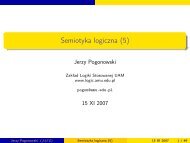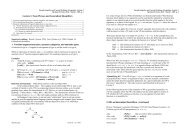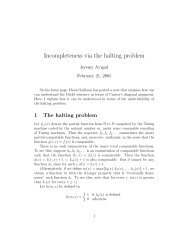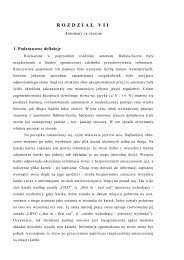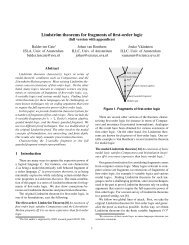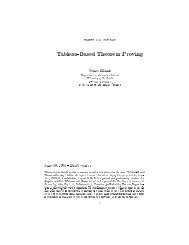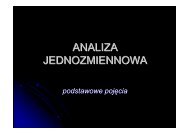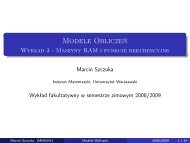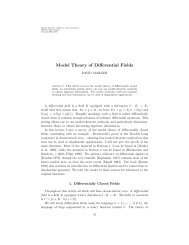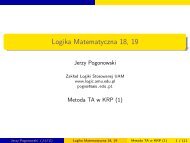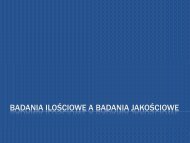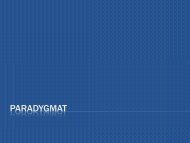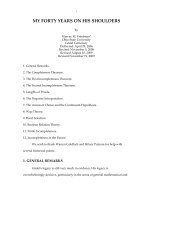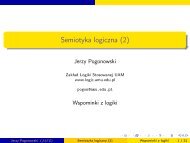MATHEMATICAL MODAL LOGIC: A VIEW OF ITS EVOLUTION
MATHEMATICAL MODAL LOGIC: A VIEW OF ITS EVOLUTION
MATHEMATICAL MODAL LOGIC: A VIEW OF ITS EVOLUTION
Create successful ePaper yourself
Turn your PDF publications into a flip-book with our unique Google optimized e-Paper software.
48 Robert Goldblatttions: every normal logic is either of degree 1 or of degree 2 ℵ0 , and there are 2 ℵ0logics of degree 1. The degree 1 logics all have the finite model property. MoreoverBlok provided a semantic characterisation of these degree 1 logics, using thenotion of a splitting logic. This is a logic Λ s for which there is some other logicΛ ′ s such that every logic Λ has either Λ s ⊆ Λ or Λ ⊆ Λ ′ s, but not both. Thus thecollection of all normal logics is split into the two disjoint collections {Λ : Λ s ⊆ Λ}and {Λ : Λ ⊆ Λ ′ s}. A simple example is given by putting Λ s = K + ✸⊤ andΛ ′ s = Λ • = K + ✷⊥. If Λ Λ • , then by the maximality of Λ • , ✷⊥ cannot be consistentlyadded to Λ, hence its negation ✸⊤ is a Λ-theorem, showing K + ✸⊤ ⊆ Λ.Let Λ/S be the intersection of all logics that are not validated by frame S.Then a logic is a splitting logic iff it is equal to the logic Λ/S for some finiteframe S that is generated from a point and has S |= ✷ n ⊥ for some n. The lastcondition holds for a finite S iff S is circuit-free, i.e. it includes no sequence ofthe form x 1 Rx 2 · · · Rx k Rx 1 for any k. If Λ s = Λ/S is a splitting logic, then thecorresponding Λ ′ s is the logic {α : S |= α} characterised by S.Every splitting logic is of degree 1, and is finitely axiomatisable. A logic Λ isof degree 1 if and only if it is a join of splitting logics, i.e. is equal to the leastlogic that includes the splitting logics Λ/S for all S in some collection C of finitegenerated circuit-free frames. This is the same as requiring that Λ be the leastlogic not validated by any member of C.Blok used algebraic methods, studying varieties, or equationally defined classes,of modal algebras rather than normal logics directly. He applied some powerfulnew techniques, including the splitting notion that had been developed in latticetheory by Ralph McKenzie [1972], and an important lemma of Jónsson [1967]characterising subdirectly irreducible algebras in congruence distributive varieties.Blok’s resolution of the issue of incompleteness for Kripke semantics was announcedin his abstract [1978a], but his report [Blok, 1978b] giving the detailedproofs was not published. Model-theoretic accounts of the results may be foundin [Chagrov and Zakharyaschev, 1997, ch. 10] and [Kracht, 1999, ch. 7].The issue of the adequacy of neighbourhood semantics (see section 5.3) wasinvestigated in a series of papers by Martin Gerson [1975a; 1975b; 1976], whoshowed that the two logics of [Thomason, 1974a] and [Fine, 1974], which arenot characterised by their relational frames, are also incomplete with respect totheir neighbourhood frames. He then gave examples of normal logics that arecomplete under the neighbourhood semantics but not complete for any class ofrelational frames. These possibilities can also be revealingly expressed in termsof algebraic semantics, beginning with the observation that complete and atomicBoolean algebras are, up to isomorphism, the same thing as powerset algebras.As we observed in section 5.3, relational frames correspond to completely additiveand normal operators on powerset algebras, while neighbourhood frames representarbitrary operations on such algebras. Thus a logic that is incomplete for therelational semantics is one that is not characterised by those of its complete andatomic algebras whose operators are completely additive and normal; while a logicthat is incomplete for the neighbourhood semantics is one that is not characterised



